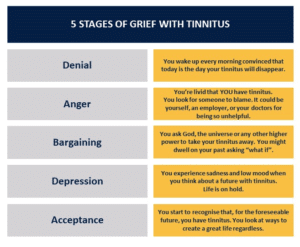I often describe learning to live with tinnitus as a journey. Grief provides the way markers for a big part. Psychiatrist Elizabeth Kubler-Ross is well-known for publishing a hugely influential work on grief. She described grief as a journey with five distinct stages:
• denial
• anger
• bargaining
• depression
• acceptance
For many of us the journey is not strictly linear. We might jump stages, then circle back to them. We might almost get to acceptance and then find we’re back at denial or anger. All of this is a completely normal part of grieving for a life which may never be the same.
The five stages
Stage 1: Denial
The first stage of tinnitus grief is denial. We can’t begin to believe that this noise in our head is there for life, and there is no cure. They must have got it wrong!
We might ask for a second or third opinion, desperate to find a doctor who will give us a different diagnosis, who will give us hope.
Or we might flip the other way. Our refusal to believe we have tinnitus means we try and ignore it. We refuse to engage with doctors or anyone who might help us with our tinnitus. We suppress the experience and all the frightening thoughts and feelings that come with it. We try – unsuccessfully – to carry on life just as we did before tinnitus showed up.
Stage 2: Anger
The second stage of tinnitus grief is anger. Who we’re angry at varies from person to person.
Some of us become angry with the ENT doctor who diagnosed our tinnitus and told us to “learn to live with it”. Others of us are angry with God or the universe for giving us tinnitus to deal with. Others become angry at whoever we blame for our tinnitus – that could be an employer or even ourselves for years of listening to music at high volume.
I was furious for a long time at the GP, who insisted that my sudden hearing loss and tinnitus was just a cold. Even now, almost 18 years’ later, I still have moments when I imagine what my life would look like if she had sent me straight to A&E or prescribed me a course of steroids as protocol recommends.
Stage 3: Bargaining
Bargaining is the third stage of tinnitus grief. We think or say things like “If you just take this tinnitus away from me I will ______________.” That blank will be very personal to you, and might include:
• never listen to loud music again
• go to church more
• give more to charity
• work harder
• be nicer to my family
When we realise that all the bargaining in the world won’t get rid of our tinnitus, we can end up being catapulted back to the anger stage, or forward to stage 4: depression.
Stage 4: Depression
The fourth stage of tinnitus grief is depression. This is the stage at which clients will most often approach me for help.
Depression kicks in when we recognise that we are not going to be cured of tinnitus anytime soon. No matter how much we work, give to charity, or go to our place of worship, our tinnitus goes nowhere. There is no deal to be done; no bargain to be struck with a higher power. The realisation can be devastating.
This situational or reactive depression is a direct response to your tinnitus distress. You might feel hopeless and have little interest in hobbies or socialising. You might feel so down that you stop caring for yourself and wonder what the point of life is.
This can be the hardest stage to work through and as well as specialist tinnitus coaching you might need counselling or medication to help you do so.
Stage 5: Acceptance
Acceptance is the fifth stage of tinnitus grief. This is the transformative stage. And it’s the stage we work towards in both the coaching and mindfulness course I offer.
It’s not just about accepting you have tinnitus. It’s also about accepting that, with a few adjustments, you can have a great life with tinnitus. To those reading that last sentence in astonishment, I can assure you that you can!
Your new, fantastic life might include accepting that earplugs are your friend, or that you need to turn your music down a notch or three, or that you need some soothing sounds to help you fall asleep in the quiet of your bedroom. It’s simply a case of doing things differently.
Acceptance takes time and is something we often need to practice again and again. It’s both the journey and the destination. It’s a relief. It’s being able to let out the breath you’ve been holding for months or years. It’s absolutely liberating. And it’s entirely achievable.


